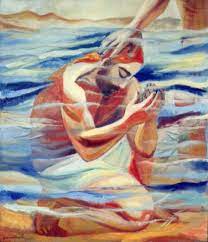
The Great Prokeimenon, sometimes chanted at Vespers in the Orthodox liturgical tradition, asks the rhetorical question, “Who is so great a God as our God?” I often think that by “great” one might also mean “gutsy”.
The gods of other nations and religions are comparatively tame and timid when set against our God. The God of the bookish, Talmud-reading Rabbis, the God of the chanting, prostrating Muslims, the God of the woke, city-dwelling Unitarians—all of them pale in comparison with our God. Their Gods play it safe, staying behind heaven’s high walls, peering down in power at earth, but not venturing personally much beyond their celestial real estate. Angels might run errands for them, but they themselves seem not to sully themselves with the dirt and death of the world down here. They remain wrapped in their divine attributes as in a kind of bubble of protection.
Not our God. In the words of His chosen vessel Paul, He “emptied Himself”, taking the form of a lowly slave, descending down the infinitely long way from uncreated divinity to created man. If you want to get some inkling of that journey, imagine how you would like to become an amoeba. The step from “Creator” to “creation” is a longer step than even that, but that is the journey that our God took, going from the highest of heights to the lowest of depths.
For He was not even content to dwell among us on the earth. In His love for mankind, He went further still, descending under the earth to Sheol, Hades, the land of the dead. He sank low enough to get under the whole of everything, and then like Atlas, arose with the whole thing swaying on His back. He then brought it back up to heaven with Him, like a shepherd carries a lost sheep on his shoulder. That took courage. That took guts. Theologians (perhaps with an unconscious lack of appreciation for the courage involved) call this project “the Incarnation” or “the plan of salvation”.
Christmas, therefore, was only the beginning. Though it all began in a cave, it did not end there. It went from the cave to the river, to the hill, to the tomb, an entryway into darker and deeper places. First God was found among men, then found among sinners, then found among criminals, each step a step further down. From the Christmas cave and manger, God then strode out to mix not only with His (now) fellow men, but also with sinners.
We must not use this last term too easily. We Orthodox often (and correctly) use the term “sinner”, but its frequent use can sometimes blunt its power. We might imagine that when we use the term “sinner” we mean, “well, no one’s perfect”. But the term “sinner” (ἁμαρτωλός/ amartolos in the Greek) actually refers to someone you take great pains to avoid your children meeting: people like pushers, addicts, prostitutes, gang members. It was people like these that came crowding around John the Baptizer on the shores of the Jordan River. It was people like these into the midst of whom our God came, being jostled by them as He also picked His way with them down to the waters to request the baptism of sinners at the hand of someone He had made. Even John himself was more than a little puzzled at our God’s presence there, and opined that it made more sense for him to be baptized by Him than the other way around.
There would be more, of course. Not content to be found among sinners, our God came to be finally found among criminals as He hung on a cross in their midst. And then, among the despairing dead. The baptism of Christ God was but another step in the divine descent. The question is: what does Theophany now mean for us?
The feast of our Lord’s baptism is called “Theophany” by the Orthodox, the manifestation of God. As our hymns declare, the Trinity was revealed that day, when the Father said that Jesus was His Son and the Holy Spirit confirmed this resting upon Him in the form of a dove. But this feast is also a revelation of the divine humility.
It took humility for the King of all to lay aside the royal robes and mix it up with us, in all our pain, ignorance, rudeness, sinfulness, stupidity, and death. But our God had what it took, and He emptied Himself out of love for us. He was humbler than we are, so we must now try to be like Him, and embrace humility ourselves. Humility, of course, does not mean feeling bad about yourself and trying to make a virtue out of poor self-esteem. Instead it means forgetting about yourself and concentrating on the needs and gifts and joys of others. At the very least it means, “don’t strut”.
As Paul the chosen vessel also wrote, after the self-emptying came the exaltation, and because Christ emptied Himself, the Father highly exalted Him and bestowed upon Him the name which is above every name, so that at the name of Jesus every knee will one day bow. Christ said it Himself repeatedly: he who humbles himself will be exalted. The Theophany baptism at Jordan’s shores not only revealed Jesus as the divine Son. It also points out for us the way home.
